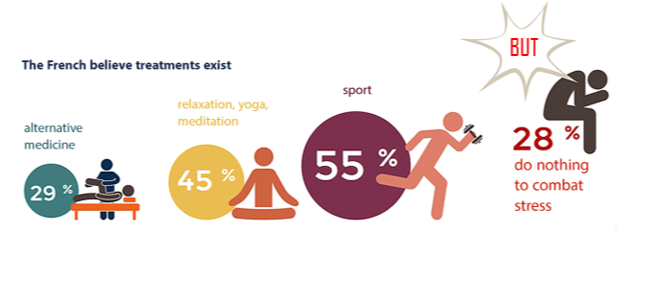The Stress Observatory
The Ramsay Générale de Santé Corporate Foundation created its stress observatory* with the first goal being to publish a stress map: are there any proven ties between stress and the illnesses that the French believe to be caused by it?

Almost 9 out of 10 French people suffer from stress and almost 4 out of 10 have become more stressed over the last 3 years. The problem affects 60% of women and 57% of young people.
- In the short term, the French believe that stress can affect their sleep (54%), their behaviour (40%) and their family life (26%), while 8 out of 10 believe that stress can impact their health in the long term.
- Some of the illnesses known to be caused by stress include: psychological diseases, obesity and diabetes, musculoskeletal disorders as well as digestive, cardiovascular and dermatological conditions.
- Scientific research on the matter doubled between 2007 and 2017. It has focused on the effects of stress on mental disorders (24%), cancer (22%) and weight and diabetes (20%).
The Ramsay Générale de Santé Corporate Foundation, whose primary goal is to improve general public preventative healthcare by leveraging its scientific college as well as the 6,000 private practitioners and 18,000 healthcare professionals who are part of the Ramsay Générale de Santé Group, has published the results of its first Stress Observatory*.
“9 out of 10 French people suffer from stress and see it as the cause of several diseases.” The Observatory’s priority was to objectify the medical consequences of stress and its associated diseases in order to determine where stress prevention may have had a significant impact on the French population’s health and thus help guide more targeted measures,” explains Dr Stéphane Locret, Director of the Ramsay Générale de Santé Corporate Foundation’s Scientific college.
The first report from the Ramsay Générale de Santé Corporate Foundation’s Stress observatory comprises two sections:
- a survey carried out with OpinionWay that aimed to establish the French’s relationship with stress
- a medical stress map produced with Kap Code, a start-up specialising in the study of health signals on social media, that compared:
- the diseases that the French associated with stress through a scan of social media posts between 2007 and 2016,
- the state of medical research publications on stress over the last decade,
- and the results of a study by Inserm (French National Institute of Health and Medical Research) on proven stress-related diseases.
Stress, the 21st-century evil: it affects 89% of the French population and has risen for 38% of them over the last 3 years
50% of the French consider themselves to be quite or very stressed, with the biggest sufferers being women (68% compared to 38% of men), those aged 25-34 years old (57%) and those living in the North-West of France (57%). And while 38% of the French have seen their level of stress rise over the last 3 years, the worst affected are those who were already very stressed, with 78% of them suffering from increased stress over the last 3 years.
The primary causes of stress are work (36%), financial problems (35%), personal life (33%) and health/chronic illness issues (31%). Work accounts for the biggest cause of stress for men (40%) and the under 35s (47%), whereas its personal life (family, children, etc.) for women (39%) and health-related issues for the over 35s (36%).

When it comes to the consequences, the French are well aware of the impact stress has on their life:
- In the short term, they believe that it has a significant influence on their quality of sleep (54%) and on their behaviour, leading to anxiety and irritation (40%).
- In the long term, 83% of the French believe that stress affects their health, a figure which increases to 95% amongst those who are very stressed. More specifically, 70% think that stress in the long term can lead to sleep disorders, 57% to psychological illnesses and 51% to heart complications.
Sport (55%) and relaxation/yoga/meditation (45%) are seen as the best ways to combat stress.
In addition to sport, 58% of the most stressed favour medical solutions, such as visiting a healthcare professional (31%), alternative medicine (19%) or medication (18%).
But in practice, almost a third of the French still make no effort to combat stress.

Are there any proven ties between stress and the diseases that the French believe to be caused by it?
In the context of its Stress observatory, the Ramsay Générale de Santé Corporate Foundation, in collaboration with Kap Code, analysed the diseases that the French associated with stress, using 8,958 conversations that took place on social media between 2007 and 2016. Subsequently, it compared this perception to the results of a study by Inserm that highlighted the diseases proven to be stress related.
- The consequences of stress on mental health were the most talked about, accounting for 56% of the discussion. They related to sleep quality, burn out, emotional suffering and addictions... diseases that the Inserm study shows are medically proven.
- Next came more general disorders, such as asthenia and tinnitus... with 15% of the comments. However, Inserm says there is no proven link between stress and these diseases.
- Diseases linked to diabetes and obesity account for 13% of the debate. And these diseases have been proven.
- Next, with a less than 10% share, were musculoskeletal disorders (tremors, contractures, etc.) at 7%; digestive issues (5%) such as nausea, ulcers and abdominal pains; respiratory problems; dermatological diseases (psoriasis, eczema, acne); gynaecological/andrological illnesses (infertility, hot flushes, hair loss) and cardiovascular diseases (tachycardia). As for these, while musculoskeletal disorders, digestive issues, heart problems and dermatological diseases are well proven, it is not the case for respiratory or gynaecological conditions.

Stress: how far along is the scientific research?
The Ramsay Générale de Santé Corporate Foundation, in collaboration with Kap Code, also analysed scientific publications related to stress from the last decade. The study highlighted that 24% of research on stress analysed its impact on mental health (e.g. insomnia, emotional suffering), 20% on metabolic diseases (e.g. diabetes, obesity) and 14% on cardiovascular conditions.
Moreover, despite the social media corpus analysed making no mention of cancer as a consequence of stress and Inserm not demonstrating any causal link either, it is to be noted that 22% of the scientific articles on stress published in the last decade have discussed its role in various forms of cancer.
* Methodology:
- Survey carried out online, from 4th to 6th October 2017, using the CAWI method, by OpinionWay for the Ramsay Générale de Santé Corporate Foundation with a sample of 1,017 people representative of the French population aged 18 and over.
- Kap Code study for the Ramsay Générale de Santé Corporate Foundation on the representation of stress on social media between 2007 and 2016.
- Kap Code analysis for the Ramsay Générale de Santé Corporate Foundation of scientific publications discussing the idea of psychological stress between 2007 and 2017.
- Inserm study on the mechanisms linking stress and disease, 2010.
